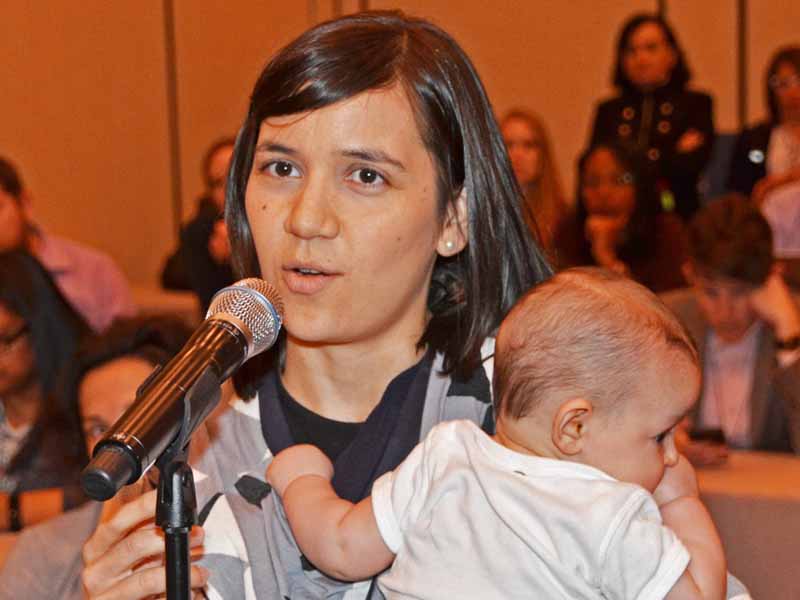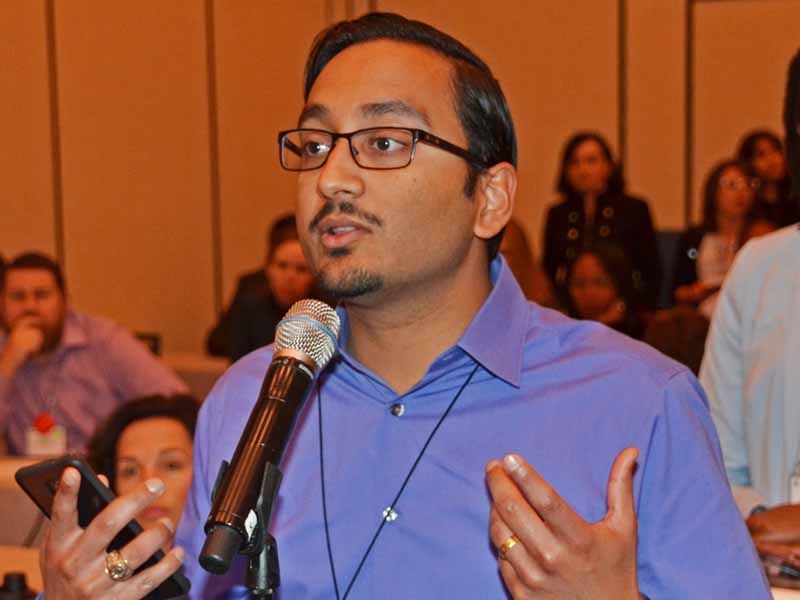FPs Call for Expanding Education Topics in Residency
May 03, 2019 01:00 pm Chris Crawford Kansas City, Mo. – During the 2019 National Conference of Constituency Leaders held here April 25-27, AAFP members from the five constituency groups -- women; minorities; new physicians; international medical graduates; and LGBT physicians and those supportive of LGBT issues -- acted on resolutions considered by the Reference Committee on Education.
Resolutions discussed during the April 26 Reference Committee on Education hearing included many that requested training on specific topics in family medicine residencies.
Expand Residency Training Topics
About half of the resolutions brought before the reference committee focused on seeking additional training at the residency level.
One resolution that was adopted as amended during the April 27 business session asked the AAFP to draft a letter to the Accreditation Council for Graduate Medical Education that strongly encourages the group to suggest residents in family medicine and other specialties take a course on appropriate use of buprenorphine and other FDA-approved medications to treat opioid use disorder before finishing their second year of training.

During the Reference Committee on Education hearing at the 2019 National Conference of Constituency Leaders, Tess Lang, M.D., a new physician delegate from Seattle, explains that the resolution she co-authored asks the AAFP to advocate that residents be required to take a course on appropriate use of buprenorphine to treat opioid use disorder before finishing their second year of training.
Additionally, the resolution called for the ACGME to encourage at least one core faculty preceptor in each residency program to apply for and receive the waiver needed to prescribe buprenorphine prior to Jan. 1, 2021.
Resolution co-author Tess Lang, M.D., a new physician delegate from Seattle, said she didn't receive training on how to treat OUD until the month before she graduated residency.
"Training in the second year allows more time and mentorship to apply your learned skills after training," she said. "It's also incredibly valuable to have the faculty be trained in treating OUD. And given how ubiquitous this issue is, it would be valuable to have the same understanding of OUD, the same way we do of treating hypertension or other things affecting so many people and causing so much mortality in our country."
Another resolution looked to the AAFP to update and strengthen its recommended curriculum guidelines for family medicine residencies on LGBT health to say, "Comprehensive understanding of gender-affirming treatment options (medical and nonmedical) are in the scope of family physicians without specialist consult based on informed consent and patient-centered care models."
Story Highlights
This resolution also called on the Academy to advocate that family medicine residencies actively include transgender health care in their curriculum.
Resolution co-author Amanda Meegan, D.O., an LGBT delegate from Minneapolis, said she chose her residency, where she continues to practice part time, primarily because of its commitment to gender-affirming health care.
"Our patients want as much care under one roof as possible, right?" she asked. "And they want welcoming clinicians who know them well … It's time now for the AAFP to strongly advocate for trans/intersex health care and training programs as much as they support training for hypertension, diabetes and preventive health."
Another resolution tasked the Academy with supporting legislation that incentivizes and/or provides funding for the inclusion of lifestyle medicine education in medical school education, graduate medical education and CME. Educational topics include, but aren't limited to, nutrition, physical activity, behavior change, sleep health, tobacco cessation, alcohol use reduction, emotional wellness and stress reduction.
"The fact is, we just don't get this education, we need it, and it should be the foundation for all of our prevention and disease management," said resolution co-author Rosalie Cassidy, M.D., a general registrant from Waterloo, Iowa. "Even if we really knew what we were doing, it still is very poorly reimbursed. So, let's get on top of this education and get reimbursement for it."
Another substitute resolution that was adopted as amended during the business session called on the AAFP to offer an applied billing and coding workshop at the National Conference of Family Medicine Residents and Medical Students.
Furthermore, it asked the Academy to collaborate with the Association of Family Medicine Residency Directors to strongly recommend that family medicine residencies offer applied in-person education (conducted by preceptors or professional coders) in billing and coding.
Lastly, the resolution charged the AAFP with updating its next practice management curriculum guidelines to note that residency annual billing and coding workshops should emphasize an applied component of that training.
Resolution co-author Sumedh Mankar, D.O., M.P.H., a general registrant from Dublin, Calif., said during residency, family physicians are vaguely taught how to bill and code.

Sumedh Mankar, D.O., M.P.H., a general registrant from Dublin, Calif., discusses a resolution he co-authored that asks the AAFP, among other things, to strongly recommend that family medicine residencies offer applied in-person education (conducted by preceptors or professional coders) in billing and coding.
"The ask is to say, 'Can we get residents to sit with coders and learn what's needed?'" he said. "Can we get the AAFP to nudge things along, so we can get that practical application on the billing side as we are residents in learning?"
Finally, another substitute resolution that was adopted asked the AAFP to advocate to prevent residency and fellowship training in maternity care from being reduced or displaced by OB/Gyn residencies at current residency and fellowship training sites.
In addition, this resolution called for the Academy to support these residency and fellowship training sites as resources of leadership and mentorship in family medicine maternity care training.
"We're asking for more vocal and visible support from the AAFP to protect and support the residency programs strong in maternity care and family medicine maternity care fellowships," said resolution co-author Shannon Bentley, M.D., an LGBT delegate from Covington, Ky.
"It shouldn't be a surprise to anybody that we're facing this alarming trend and the rise of maternal morbidity and mortality, as well as infant morbidity and mortality," she added. "Our training and our history (as family physicians) prepare us well to address these alarming trends."
Bentley said, for example, that her residency opted to close a family medicine maternity care program that had been a successful training ground for 20 years.
"Now more than ever we need the AAFP to recognize that hospitals and residencies, for whatever reason, are opting to displace family medicine maternity care training for other residencies or training programs," she said. "We would like our Academy to reach out to these communities, residencies and institutions where family docs provide maternity care and act to address this crisis rather than indirectly contributing to it by remaining silent at this critical time."
Other Issues
NCCL delegates also adopted resolutions considered by this reference committee that asked the AAFP to
- support medical students and residents with disabilities,
- provide resources on how to best work with advanced practitioners,
- publish the number of live CME lectures/sessions that address social justice and health equity issues,
- advocate for appropriate lactation accommodations at American Board of Family Medicine testing centers, and
- improve visibility of links to FREIDA, the AMA residency and fellowship database.
Related AAFP News Coverage
2019 NCCL
Family Physicians Go Big With Advocacy Agenda
(5/3/2019)
2019 NCCL
FPs Hammer Out Practice-related Measures for AAFP to Take Up
(5/1/2019)
2019 NCCL
Delegates Focus on Race in Medicine, Gender-affirming Care
(5/1/2019)
2019 NCCL
Member Constituency Delegates Reject Purity Politics for PAC
(4/30/2019)
2019 AAFP Leadership Conference
Family Physicians Voice Questions at Town Hall Meeting
(4/30/2019)
2019 NCCL Delegates Elect New Leaders
(4/27/2019)
2019 NCCL
Family Physicians Learn to Say 'Yes, And …'
(4/26/2019)